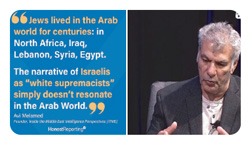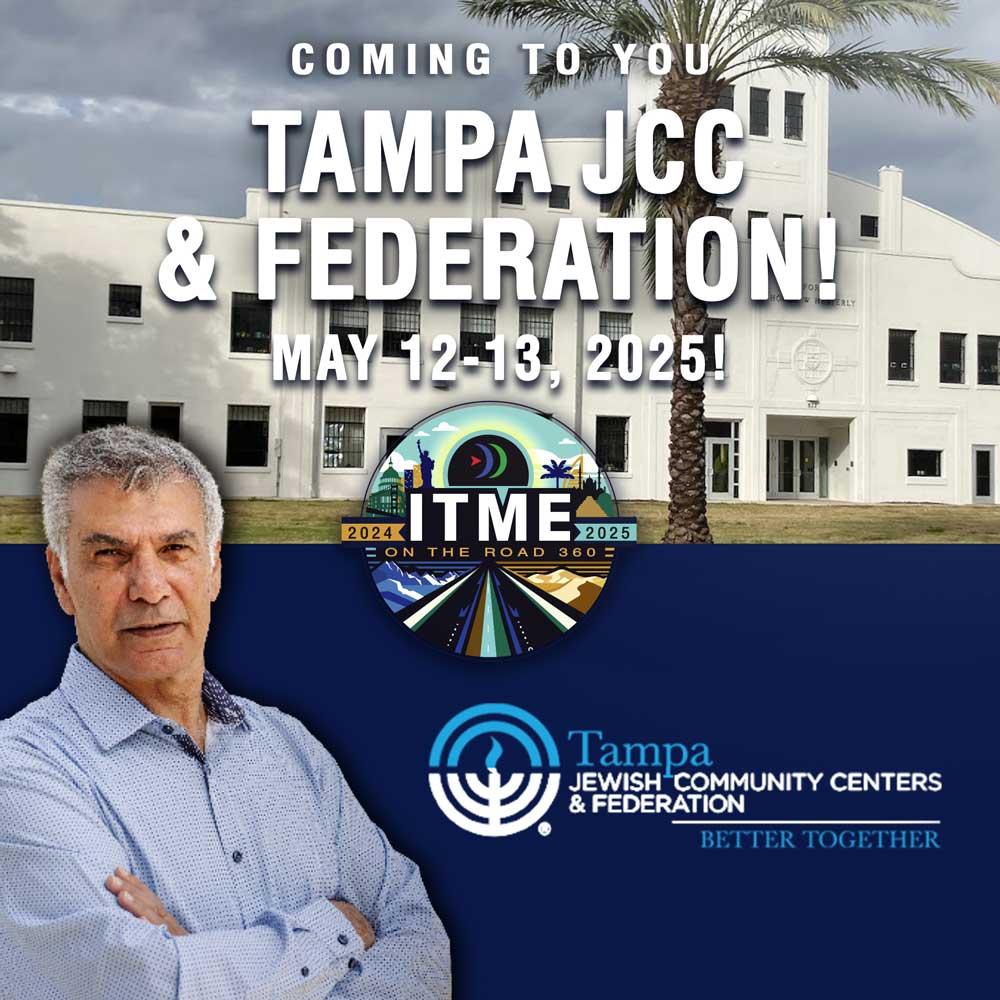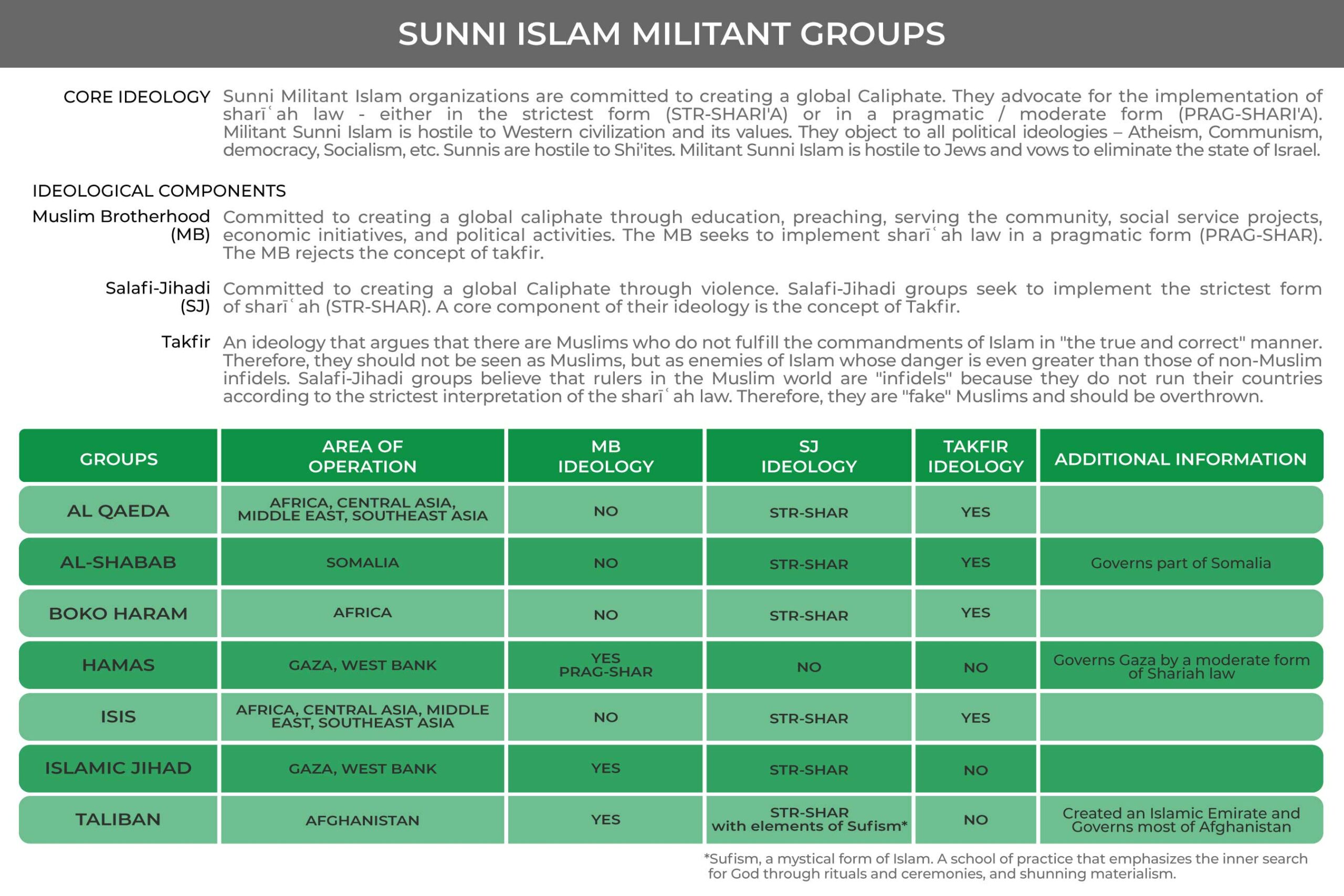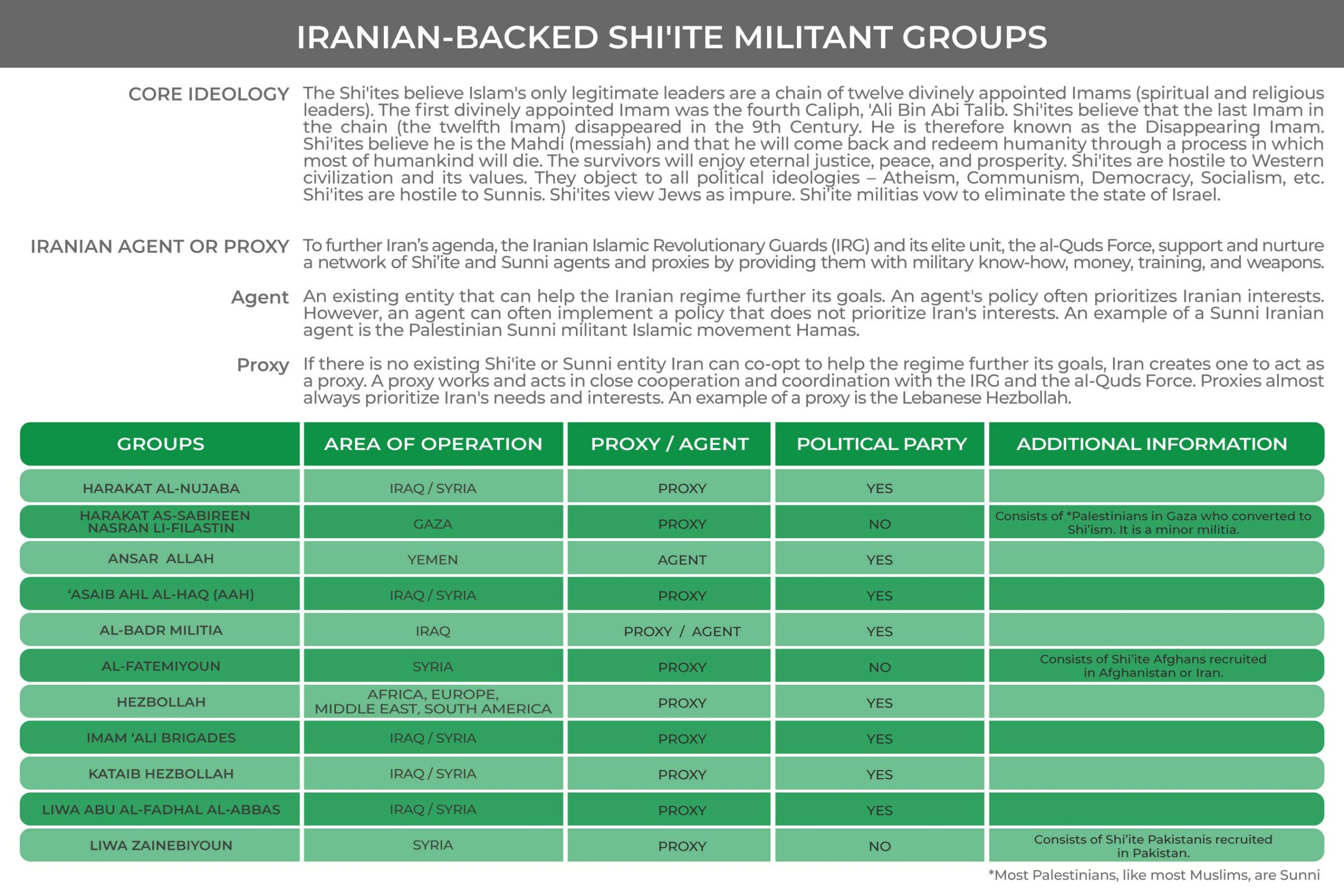|
Getting your Trinity Audio player ready...
|
Session Three | ISLAM IS THE SOLUTION – THE RISE OF MILITANT ISLAM
Session Agenda
Summary | Where We Left Off…
Introduction | Islam & the Features of the Middle East
Islamic Modernists
Political Islam and The Muslim Brotherhood
Salafi Ideology
Sayyid Qutb | Laid the Foundation of Salafi-Jihadi Militant Islam
Salafi-Jihadi Militant Islam Ideology
Radicalization Within Militant Islam Ideology | Takfir Ideology
Introduction to the Next Class + Q & A
Overview
This session explores the foundational aspects of Islam and its significant influence on the Middle East. It begins by examining Islam’s comprehensive legal framework, Shari’ah, which guides both personal and state affairs, unlike Christianity’s separation of religion and state. The session then introduces Islamic modernists from the late 19th and early 20th centuries, who sought to blend Islamic principles with modernity to address societal challenges. It further delves into the rise of political Islam, represented by movements like the Muslim Brotherhood and the Salafi movement, aiming for a global Islamic Caliphate governed by Shari’ah. The discussion highlights the radicalization of Islamic thought, leading to the emergence of militant groups like Al-Qaeda and ISIS, driven by ideologies that reject Western values and aim to establish strict Islamic rule. The session concludes by emphasizing the ongoing impact of militant Islam, shaped by socio-political and economic hardships in the Muslim world.
Background Reading For Session 3
INTRODUCTION | ISLAM & THE FEATURES OF THE MIDDLE EAST
Islam—the dominant religion in the Middle East —is a religion, like Judaism, which contains many laws that guide the believer in every aspect of life. Islam – unlike Christianity, does not separate between religion and state. In Islamic view – the two are intertwined. Muslim religious legal authorities hold the most central position in the shaping of the personal, political, cultural, and social norms of the Muslim world, and they directly affect the lives of hundreds of millions of Muslims.
Muslim religious sages who have acquired official Islamic theological training and higher education as religious legal authorities are called mufti in Arabic and are qualified to issue fatwās. Fatwās address a wide variety of subjects pertaining to the private life of the individual.
ISLAMIC MODERNISTS
Arab and Muslim cultural, political, social, and religious codes of conservative thinking and behavior have been consolidated over hundreds of years.
In the late nineteenth and beginning of the twentieth century, the increasing presence of the West in the Arab and Muslim world coupled with Arab encounters with the West and Western culture, led to the appearance of a stream of Islamic thinkers known as the “Islamist modernists.”
Islamic modernism was advanced by scholars such as Jamāl al-Dīn al-Afghānī (1838–1897) Muhammad ʿAbduh (1849–1905). The Islamist modernists believed that creating a society governed by the ideals and laws of pure early Islamic sharīʿah, which also embraced modernity, was the cure for the challenges of Muslim society. Though opposed to the West and its values, the modernists did not regard the Muslim society’s encounter with the West and its culture to only be a source of threat; instead, they viewed the meeting of the two as an opportunity for cultural, economic, political, and social growth—progress for Arab societies and for the world of Islam.
Yet, the voice and outlook of Islamic modernists will be overwhelmed by a radicalization process within Islamic thought during the 20th Century, a process that will result in the emergence of brutal militant Islamic organizations. This radicalization process took place over a very short period of time, and it had a couple of milestones, starting with the emergence of the ideology known as Political Islam.
POLITICAL ISLAM CORE IDEOLOGY
Contemporary Sunni militant Islam is rooted in the two main camps of political Islam: the Muslim Brotherhood and the Salafi movement.
The term “political Islam” refers to movements and parties in the Muslim world that have the following things in common:
- Their ultimate goal is to create a global Islamic cultural, political, and religious entity known as Khalafa / Caliphate in which no other independent or sovereign state exists.
- The Khalafa should be governed and ruled by Islamic law; the Shari’ah (literally translated “the path”).
- They believe that the Shari’ah, the moral and religious law, is the Master Plan given by Allah (literally translated “the God”) to mankind. As such, it is the manifestation of Allah’s ultimate will, and therefore people should live their life only according to the Shari’ah. Accordingly, the Shari’ah should be the only source of legislation and the supreme governing authority and should govern all areas of life – public and private.
- Any other political philosophy or political system (communism, democracy, socialism, etc.) is unacceptable because it is man-made, therefore it is imperfect, unjust, and doomed to fail. Furthermore, adopting these systems is in defiance of Allah’s will.
- They completely reject political frameworks, ideologies, and values that are not Islamic.
- Though they reject democracy, it is legitimate in their view to use democratic elections and democratic government systems, such as parliamentary, multi-party-political systems, etc. as a temporary and tactical tool to achieve their ultimate goal which is to create a global Khalafa.
- They are willing to participate in government as a temporary stage towards fulfilling their ultimate goal – to create a global Khalafa.
- They completely oppose, and are in direct conflict, with Western values such as gender equity, homosexuality, liberalism, pluralism and secularism.
- They are less tolerant of diversity, freedom of expression, freedom of religion, freedom of thought, human rights, individualism, liberty, open-mindedness, etc.
- They view Western values as an imminent and existential threat to Islam.
- They create their support and cultivate their power base through creating economic, educational, social, and welfare programs that benefit the broad public, especially people on the lower end of the socio-economic scale.
- They create educational and religious programs and institutions to educate and embed the values and ideology of political Islam in as many people as possible and they use these frameworks as a platform to percolate and spread their ideology as far as possible.
- A core belief is absolute and uncompromising opposition to the existence of the State of Israel. The animosity towards Israel is justified upon Islamist theology. According to the ideology of political Islam Jews are not a nation. Judaism, as a religion was once a valid religion, but the Jews betrayed the Divine Mission that they were given by Allah, – to spread Allah’s rule and justice upon the land – and therefore he punished them and dispersed them in the world and sent Islam as the real religion to guide mankind. Therefore, in the eyes of political Islam, the existence of Israel is not only unjustified because Jews are not a nation; but the existence of Israel is a direct defiance of Allah’s will.
THE MUSLIM BROTHERHOOD
The most prominent representative of political Islam is the Jamaat al-Ikhwan al-Muslimin – the Muslim Brotherhood, (MB) the biggest mass movement in the Muslim Sunni world.
The Muslim Brotherhood was founded in Egypt at the end of the 1920’s by Hassan al-Banna (1906–1949), an Egyptian teacher and Iman (preacher) who was Inspired by Islamic conservatives thinkers like Mawlana Abūʾl-Aʿlā Mawdūdī, (1903–1979) the founder of Jamaʿat-i Islami (Islamic Society) in southeast Asia, and its leader until his retirement in 1972, and Sayyid Abul-Hasan Ali al-Hasani al-Nadawi (1914–1999).
Al-Bana was alarmed by what he perceived to be a Western threat to Islam and an attack on Islam’s codes, morality, and values – such as male-female social interaction, movie theaters, music, western dress, women’s liberation, etc.
He created the Muslim Brotherhood as a revolutionary group to restore the Khalafa, through education, preaching, indoctrination and proselytization of the masses – a term known as da’wa (literally translated “call” or “an invitation”).
Identifying the growing challenges within the Muslim and Arab world, Al-Bana came up with the battle cry of the MB – ‘Islam is the Solution’ (‘Al-Islam Huwa al-hal’).
People who adhere to the Islamic conservative philosophy are often described in Arabic as Islāmiyyun, Islamists.
SALAFI IDEOLOGY
Another major group within Political Islam is the Salafi Movement.
The word salaf means the past of something, its origin, its roots, its primal source.
The origins of Salafi thought are deep in the sands of the Arabian Peninsula.
Salfi thinkers and theologians believe that Islam will thrive and flourish again once Islam adopts and applies the Islamic codes, law, norms and values as they were in the time of the Prophet Muhammad and his first four successors, known as Al-Khulafa-ur-Rashidun, The Rightly-Guided Caliphs. The term Khalifa / Caliph is part of a term Khalifat Rasul Allah, “the Replacer of Allah’s messenger” – Prophet Muhammad, the founder of Islam. People who adhere to the Salafi philosophy are often described in Arabic as Mutashadidun Islāmiyyun, – hardliner, ultra-conservatives Islamists.
Salafi ideology laid the foundation of contemporary Islamic fundamentalism which has two branches. One branch is the camp of non-militant Islamist fundamentalists whose members adopt the strict implementation of sharīʿah law but do not strive to impose it on others using force; instead, they use preaching, educating, and political action.
Some fundamentalist groups, like the Egyptian group al-Qutbiyun, which was created in the 1960s and named after Sayyid Qutb, or Ahl al-Khaf (People of the Caves), choose to physically segregate themselves. This separation aims to defend their way of life, norms, and values from the surrounding society that is—in the eyes of fundamentalists—morally decadent and corrupt.
People who adhere to the Salafi philosophy are often described in Arabic as usuliyun mutashaddidun or Mutashadidun Islāmiyyun, – hardliner, ultra-conservatives Islamists. (extreme fundamentalists or extreme Islamic fundamentalists).
THE CONCEPT OF ‘TAMKIN‘
The Muslim Brotherhood and the Salafis are marathon runners – the Arabic term Sabr (patience) is one of their core values. This characteristic is manifested by another core value of political Islam known as Tamkin. The term Tamkin means “to make possible.” Meaning, focus today on creating the conditions and the laying of the foundations for a future—undefined in time—in which it will be possible to actualize the vision of the global Khalafa based on the full implementation of the Sharia’ah in all aspects of life. The achievement of this goal justifies temporary political and ideological compromises and flexibility if necessary. In simple terms – the end justifies the means. Tamkin is the central code that guides, and will continue to guide, political Islam, the leadership of the Muslim Brotherhood, and is also the core of the mainstream Salafi thinking.
Since the early days of the Muslim Brotherhood, it has had—in addition to its educational, social, and welfare initiatives—a violent yet largely confidential terror arm operating under the code name al-Nizam al-Khass (the Special Apparatus).
Throughout its history, the conflict between the Muslim Brotherhood’s vision of a global caliphate ruled according to sharīʿah law and the model of modern national statehood has led to collisions—sometimes violent ones—between the Muslim Brotherhood and state governments; al-Nizam al-Khass is utilized when necessary to promote its agenda.
Since its inception, there was a built-in political and ideological tension between the MB , with both particularistic nationalism (Wataniyah) and Pan-Arabism (Qaum) ideologies, which set the movement on a collision course with the Arab governments and rulers.
In Egypt, in 1948, members of al-Nizam al-Khass assassinated the Egyptian prime minister Mahmūd Fahmī al-Nuqrāshī.
Hassan al-Bannā’, the founder of the Muslim Brotherhood movement, was assassinated in 1949, allegedly by Egyptian government agents.
In the 1950s, the Muslim Brotherhood attempted to assassinate Egypt’s President Gamal Abdel Nasser, but failed.
And over the years, the organization’s leaders and activists have been arrested and tortured, sometimes executed, by the Egyptian government.
From the 1930s onwards the MB was on the run in most Arab countries. The MB was on a collision course with supporters of Qaum (Pan-Arabism) and the regimes that promoted a Pan-Arab ideology like Egypt, Syria, Iraq, Yemen. The organization was also on a collision track with the Hashemite monarchy of Jordan.
The combination of deepening multi-dimension crises in the Arab world, together with the oppression of the MB, resulted in almost inevitably an ideological radicalization translated into militarization process within Islamic circles.
The lead proponent of the radical and violent militarization of Islam was a senior member of the Muslim Brotherhood. A man named Sayyid Qutb.
SAYYID QUTB | THE PROCLAIMER OF SALAFI – JIHADI MILITANT ISLAM
Sayyid Qutb (1906–1966) was an Egyptian scholar and educator and a senior member in the MB during the 1950s and 1960s.
Qutb’s core ideology was that Islam and the Muslim world is experiencing a phase of Jahiliya – ‘darkness’ and every person faces two options: either full submission to Islam and non-compromising implementing of the sharīʿah law to embrace Allah’s rule or to be part of the Jahiliya.
In Qutb’s view, only strict radical hardline ideology, which not only legitimized the use of violence but made it mandatory, laid the foundations for contemporary militant Islam.
Qutb’s ideology and was seen as a threat to the government.
He was hanged in 1966, convicted of plotting to assassinate President Nasser.
Sayyid Qutb’s essential ideas were:
- The need to create Shari’ah rule as the one and only legitimate law.
- The need to topple any regime which does not implement Shari’ahlaw.
- The need to proactively and violently create the Khalafa.
- The need to reject and unwaveringly oppose all western values.
- Eliminate the state of Israel and Jews.
Qutb’s concepts, combined with the Salafi ultra-conservative ideology, gave birth to the Salafi-Jihadi militant Islam ideology.
SALAFI-JIHADI IDEOLOGY
We have discussed earlier the term Salafi. Let is now explore the term Jihad.
The word jihad is translated literally as “an effort.” The term Jihad is part of a broader concept in Arabic – Jihad fi Sabil Allah – translated as “an effort to implement Allah’s way.”
The term Jihad has evolved and transformed throughout different phases in the history of Islam.
In the very early phases of Islam the meaning of Jihad was an intensive spiritual effort on the part of Muslims whose aim was to reach a higher degree of inner purity in their belief and to worship Allah purely. Due to the persecution and the harsh conditions the first Muslims endured, Jihad evolved to not only be the spiritual effort of the believer, but also the willingness of Muslims to sacrifice materially and physically, and to suffer stressful and uncomfortable conditions in order to follow their faith.
During the seventh century, Muhammad and his followers, through the use of military campaigns, expanded Islam’s influence and control throughout the Arab Peninsula and northwards towards Iraq and Syria. This is when a new dimension was added to the concept of Jihad; it became not only about the willingness to die or to be killed while defending Islam’s and its ideology, laws and values; it was now also about the willingness to die or get killed as an offensive act while proactively spreading Islam, expanding its territory, spreading the Islamic religion, and imposing Islamic rule on others.
The goals of Salafi-Jihadi militant Islam are:
- Establish the Khalafa, in which everyday life and every aspect of life is conducted according to the strictest orthodoxy of the Islamic religious law, the Shari’ah.
Though they share the same vision of Khalafa, there is a significant difference between militant Islam and political Islam on that issue.
Political Islam stands for the concept of Tamkin. As I said above, the term Tamkin means – “to make possible.” Focus today on creating the conditions and laying the foundations for a future—undefined in time—in which it will be possible to actualize the vision of the global Khalafa based on the full implementation of the Shari’ah in all aspects of life.
Militant Islam, however, stands for a different approach known as Takwin. The term Takwin means the “immediate establishment.” Meaning, it is necessary now to establish a Khalafa, based on the full and strict implementation of the strict orthodoxy of Shari’ah in all aspects of life. The realization of this goal requires uncompromising ideological rigidity to the values of militant Islam; and the goal must be achieved in a short, intensive process wherein you must use all means necessary including – and actually, primarily – the use of violence.
- Overthrow all current political structures in the Muslim and Arab world, because in the eyes of militant Islam the current governments and rulers in the Muslim and Arab world are illegitimate, because they do not rigidly and strictly apply and enforce the Shari’ah.
- Wage war on the West and its values which threaten the Islamic religion and the Islamic civilization.
- Wage war on the Jews
- Wage war on Shi’ites
Stemming from its rigid ideology and clear goals, militant Islam praises a core value known as Talb a-Shahadah – “the Quest for Martyrdom.” In the eyes of militant Islam, life is not the most sacred value; there is a higher and nobler objective – and that is the glory of Islam and the establishment of Allah’s rule over the human race. To that end, according militant Islam, Muslims are expected not only to be willing to sacrifice their life; they are expected to want to sacrifice their life.
Throughout the last third of the 20th century, militant Islam added another aspect that perhaps was not envisioned by Qutb or the Salafi thinkers. An extreme school of thought has evolved within militant Islam ideology called Takfir which has taken violence to even more extreme levels.
ISIS theologians argue there are two types of fake Muslims.
One type of fake Muslims, according to the ISIS ideology, are Muslims who either, because of laziness and or a lack of religious devotion, knowingly and intentionally do not follow the Shari’ah, and worse – they pretend as if they do. In ISIS’ view these people must be executed because they are contaminating Islam from within.
The second type of fake Muslims, in the eyes of ISIS theologians, are Muslims who out of ignorance do not follow the Shari’ah. The term describing that ignorance is “Jahiliyyah “- a term used by Islam to describe the pre-Islamic period, a time that is described in Muslim thought as a period of “Barbarism and Darkness.” Thus, the second kind of Kuffar Muslims are “Juhhal” ignorant people, living in darkness. They, therefore, should be redirected to see the light – meaning Islam – through education – and if needed, through the use of non-fatal punishments and sanctions – to become “true” Muslims.
Takfir distorted ideology is the emergence of militant Islam groups who murder Muslims indiscriminately in the name of Takfir.
RADICALIZATION WITHIN MILITANT ISLAM IDEOLOGY | TAKFIR IDEOLOGY
In less than a generation, militant Islam ideology has been further radicalized. That process is reflected in the appearance of the Takfir ideology.
The term Takfir relates to a very basic concept in Islam known as kufr billah (heresy).
Islam argues that the world is divided into two major groups – Muslims who adopt Allah’s rule and those who do not.
The term Islam means the total – emotional, intellectual, physical and spiritual willingness of a person to subdue themselves to the concept of monotheism and Allah.
A Muslim then, is a person who submits willingly and consciously to Allah’s rule. All those who do not fully subject themselves to that concept are not Muslims and therefore they are Kafirun or Kuffar (infidels).
Takfir ideology argues there are not two kinds of people, there are three kinds of people: Muslims, Infidels, and Muslims who “pretend” to be Muslims but are not “real Muslims,” they are “fake Muslims.”
Those “fake Muslims” are thus even worse than Kuffar (infidels) because – according to Takfir ideology – the Muslim “infidels” are “corrupting” and “contaminating” Islam and its values from within, and as long as Islam in not pure from within, the ultimate vision of establishing Allah’s dominion on earth cannot be realized. Therefore, Takfir ideology believes that Islam must be “purified” of “Muslim impersonators.”
The outlook of Militant Islam groups and thinkers that evolved into the concept of Takfir reflects the radicalization process which took place within Militant Islam ideology and modus operandi within less than a generation.
Al-Qaeda which in Arabic means “the base,” “the foundation,” or “fundamental” – was established by Saudi born, Osama bin Laden in the late 1980’s. It is a global Islamist Salafi-Jihadi militant organization. Al-Qaeda is the mother movement of ISIS. When ISIS announce the establishment of Caliphate in Iraq and Syria, al-Qaeda opposed that move, arguing that ISIS theologians have neither jurisdictional nor moral authority to announce the establishment of Caliphate. Al-Qaeda’s leaders and theologians are reluctant to adopt the concept of Takfir. Thus, they opposed ISIS’ brutal implementation of Shariah law. As a result, there is a power struggle between Al-Qaeda and its offspring, ISIS.
ISIS or as it defines itself formally – the Islamic State (IS) is also referred to as the Islamic State of Iraq and Syria (ISIS) is also referred to as the Islamic State of Iraq and the Levant (ISIL); the Islamic State of Iraq and ash-Sham (ISIS) (a-Sham is the Arabic name which for centuries referred to a geographic area consisting of what is today Israel, Jordan, Lebanon and Syria); In Arabic is it known as Al-Dawlah Al-Islamiyah – the Islamic State; Al-Dawlah al-Islāmiyah fīl-ʿIrāq wash-Shām – the Islamic State of Iraq and ash-Sham; and it is primarily known by in the Arab world and in Israel by its initials Da’ish / Da’eesh / Daesh. I prefer to use the term ISIS because that is the name most commonly used in the media and in public discourse in the West.
ISIS theologians argue there are two types of fake Muslims and they differentiate between the two types of fake Muslims:
One type of fake Muslims in the ISIS ideology are Muslims who either, because of laziness and or a lack of religious devotion, knowingly and intentionally do not follow the Shari’ah, and worse – they pretend as if they do. In ISIS’ view these people are destined to, and must be executed because they are contaminating Islam from within.
The second type of fake Muslims, in the eyes of ISIS theologians, are Muslims who out of ignorance do not follow the Shari’ah. The term describing that ignorance is “Jahiliyyah “- a term used by Islam to describe the pre-Islamic period, a time that is described in Muslim thought as a period of “Barbarism and Darkness.” Thus, the second kind of Kuffar Muslims are “Juhhal” ignorant people, living in darkness. They, therefore, should be redirected to see the light – meaning Islam – through education – and if needed, through the use of non-fatal punishments and sanctions – to become “true” Muslims.
Al Hazimi Branch is named after Ahmad Bin Omar Al Hazimi is a Saudi Salafi-Jihadi preacher advocating what is described as “a more extreme and brutal version of the ISIS ideology.” Ironically, Al Hazimi, who echoes Qutb’s ideas, labels the Muslim Brotherhood, the largest Sunni Islamic Muslim movement in the world, as Quffar (infidels) because the MBaccepts the narrative that Judaism and Christianity are legitimate monotheistic religions, and thus deserve to be protected by Islam.
Al-Hazimi is more extreme than ISIS in his translation of the Takfir ideology. While ISIS differentiates between two kinds of ‘Fake Muslims’ and thus offers a ‘corrective process through education’. Al-hazimi on the other hand, argues that all ‘fake Muslims’ are the same, and therefore should be treated according the Shari’ah law which orders the execution of such a person.
Takfir distorted ideology is the emergence of militant Islam groups who murder Muslims indiscriminately in the name of Takfir.
SUMMARY
The militant Islam that appeared in the 20th century is the product of four main factors
- Fundamentalist thinking that existed in Islam throughout history
- The direct encounter with the West that revealed the inferiority of the Islamic world in relationship to the West
- The socio-political economic hardships in the Muslim and Arab world
- Ideologies such as pan-Arabism or particularistic nationalism that presented alternatives that threatened the central basis of the Islamists – which is the concept of the rule of Allah and the application of Islamic law.
In the evolution of radical and militant Islamic camp in the 20th century, there are two main characteristics important to point out:
One characteristic is that the ideological and operative radicalization occurred within a short period of time in historical terms.
A second characteristic is that extremism has created even more extremist variants. The Salafis who belonged to political, non-violent Islam, and some of whom chose to live a life of isolation, were the womb for the emergence of groups such as Al-Jama’a al-Islamiyya (The Islamic Group) who prioritized and radicalized the use of violence. The Salafi-Jihadist ideology was the womb of Al-Qaeda, which grew a more extreme variant in the form of ISIS, which in turn grew a more extreme variant in the form of the Al-Hazimi branch.
Militant Islam is the bitter fruit of poverty, underachieving societies, corrupt and oppressive regimes and rulers, an environment engulfed with violence and aggression.
As long those features exist, militant Islam is here to stay, and totally defeating Militant Islam ideology is a long, long process.
Lexicon for Session 3
Abdullah Yusuf Azzam (1941–1989)
Palestinian Sunni Islamic scholar and Salafi-jihadi theologian. To help the Afghan Mujahideen (militias that fought the Soviet Union when they invaded 528 inside the middle east Afghanistan in 1979) fight against the Soviets, he encouraged Muslims to commit defensive and offensive jihad. Azzam was a teacher and mentor of Osama bin Laden, and together they created al-Qaeda. Azzam was killed with his two sons in a car explosion. Hamas’s Military Academy in the Gaza Strip is named after Azzam
Abu Bakr al Baghdadi (1972–2019)
Ibrahim Awad Ibrahim Ali al-Badri al-Samarrai. The leader of the Islamic State of Iraq and the Levant (2014–2019). Killed by the US in 2019.
Ahmad Yassin (1937–2004)
Founder of Hamas. He called for the elimination of Israel through violence and called for establishing a Palestinian Islamist entity. He was killed by Israel.
Al Da’wah
Literally translated as ‘The Preaching.’ It is one of the core ideals and principles of the Muslim Brotherhood. Al Da’wah mainly promotes educational activities in various frameworks (mosques, summer camps, schools, conferences, etc.) whose purpose is to educate according to Islam’s values and strengthen the movement’s support and infrastructure.
Al-Jamma’ah al-Islamiayh
‘The Islamic Group’ Islamist movement
Al Islam Huwa al-Hal
“Islam is the Solution”—a central slogan of the Muslim Brotherhood.
Allah
The One God
Al-Qaeda / Al-Qaida
“The Base” or “The Foundation.” Al-Qaeda is a Salafi-jihadi organization formed by Osama Bin Laden and Sheikh Abdullah Yusuf Azzam in the late 1980s.
Ayman al-Zawahiri (1951– 2022)
Leader of Egyptian Islamic Jihad. He, Osama bin Laden, and Abdullah Yusuf Azzam, a Salafi-jihadi theologist and military commander of Palestinian origin, established al-Qaeda in Afghanistan. Killed in Afghanistan by the US in July 2022
Caliph / Caliphat Rasul Allah
Translated as “the replacer of Allah’s “God’s” messenger (Prophet Muhammad).” The first four caliphs in Islam are known as the Four Rightly Guided Caliphs— who were either nominated by their predecessor or elected by a religious advisory council.
Caliphate
The economic, social, administrative, and political governing framework of the Muslim Empire. In the Islamic view, there is no separation between the Islamic religion and the governing / political entity. The Caliphate is a global Islamic cultural, political, and religious entity run by shari’ah law in which no other independent or sovereign state exists.
Fatwah
An Islamic religious ordinance issued by an authorized Islamic cleric.
Hassan al-Bana (1906–1949)
An Egyptian educator. He founded the Muslim Brotherhood movement in the late 1920s. Al-Bana was murdered—apparently under the Egyptian Government’s orders after the assassination of Egyptian Prime Minister Mahmoud Fahmi Nukrashi by a terrorist assassin (December 1948).
Hamas
Harakat Al-Muqawama Al-Islamia—the Islamic Resistance Movement. Hamas also is literally translated as a ‘religious enthusiasm.’ It is a Palestinian Islamist militant and political organization founded in the Gaza Strip in 1987. Hamas defines itself as a subsidiary of the Muslim Brotherhood movement and the branch of the Muslim Brotherhood in Palestine. Hamas’s vision is to eliminate the State of Israel in a violent struggle and establish a caliphate ruled by Islamic law in all areas of Israel. Hamas has controlled the Gaza Strip since 2007 after they launched a coup against the Palestinian Authority in Gaza. Hamas is defined as a terrorist organization by many countries. Hamas is an example of an Iranian agent
Harakat al-Shabaab al-Mujahideen (HSM)
A Salafi-jihadi group based in Somalia known as Al-Shabab (The Youth).
Harakat as-Sabreen Nusran li-Filastin
A splinter group that broke off from the Islamic Jihad in Palestine organization in Gaza Strip. Backed by Iran
Islamic Fundamentalism and Militant Islam Islamic Fundamentalism
Shares the same ultimate vision of political Islam.
Muslim fundamentalists want to create a Caliphate ruled by the strictest interpretation of the sharīʿah. Islamic fundamentalists entirely reject Western values and call for returning to the early years of Islam’s pure ideals and laws. Islamic fundamentalists that want to implement sharīʿah law according to the most puritan dogmatic interpretation are known as Salafists.
The ideology they ascribe to is known as Salafi. The word salaf means “what has been previously.” Salafism’s core ideology is that Islam will thrive and flourish again once Muslims return to the roots, to the origin of Islam, and adopt and apply the Islamic codes, law, norms, and values as they were in the time of the Prophet Muhammad and his first four successors.
Contemporary Islamic fundamentalism (called in Arabic Usuliyah, which means “going back to the origin or the roots”) has two branches. One branch is the non-militant Salafi Islamist fundamentalist camp. Non-militant Salafi Islamists are called Usuliyun. Usuliyun follow a strict interpretation of sharīʿah law. But they do not try to impose it on others forcefully. Instead, they use preaching, education, and political actions to try to gain followers, grow the movement, and fulfill their religious objectives. Some choose to isolate themselves and minimize their interaction with the surrounding society, state authorities, and institutions. The other branch of contemporary Islamic fundamentalism is the militant camp—Militant Islam. Fundamental militant Islam adheres to the SalafiJ-ihadi ideology. Militant Islamists are often called Usuliyun Mutashaddidun or al-Mutashaddidun al-Islamiyyun. As I said above, the word usilyun or usuliyah means “the origin or the roots.” The word Mutashaddidun means “extremist.”
Militant Islamists are what is often referred to in Western media as “extreme fundamentalists” or “extreme Islamic fundamentalists” or “radical fundamentalists.” The West is most familiar with the following militant Islam Salafi-jihadi ideology groups Al-Qaeda, Al-Shabab “The Youth” in Somalia, African-based Boko Haram “Western Values are Forbidden,” Global Jihad, ISIS, Islamic Jihad, and the Taliban.
A core value of all Salafi-jihadists is the concept of Talb a-Shahada—”the quest for martyrdom for the glory of Islam and Allah’s rule.” To summarize their value system: It is good, necessary, and noble to kill and be killed for the sake of Allah. For militant Islamist groups, violence is an essential tool that they must use to bring about the caliphate.
ISIS/ISIL/The Islamic State
ISIS began in 2006 as a militant Islamic militia of Sunni tribes in central Iraq.
ISIS is an acronym for the “Islamic State of Iraq and Syria” or the “Islamic State of Iraq and ash-Sham.”
For centuries, Ash-Sham is the Arabic name that referred to a geographic area of Mesopotamia—consisting of what is today Israel, Jordan, Lebanon, Syria, and Iraq.
In Arabic, ISIS is called Da’esh. The term “Da’esh” is made of the initials “Al-Dawla al-Islamiya fi(l) Iraq wal-Sham” (the Islamic State in Iraq and ash-Sham). I
n April 2013, ISIS became the branch of Al-Qaeda in Iraq. They called themselves “Al-Qaeda in the Two River Countries.” The rivers are the Tigris and the Euphrates—a region historically known as Mesopotamia.
In June 2014, ISIS declared its “Caliphate”—the Islamic State (I.S.). At its height, the Islamic State encompassed 30 percent of Syria and 40 percent of Iraq.
In July 2014, the leader of ISIS—Ibrahim ‘Awad Ibrahim ‘Ali al-Badri al-Sameraai a.k.a. Abu Bakr al-Baghdadi—announced himself the Caliph Ibrahim.
In the second half of 2017, the military pressure of the international coalition forces that joined together to fight the Islamic State began to reverse some of ISIS’s gains.
Throughout 2017, 2018, and 2019 ISIS suffered mounting casualties and lost strongholds.
The Islamic State came to an end in 2019. The United States killed Abu Bakr al-Baghdadi in October 2019.
One of the most substantial ISIS branches globally is the “Islamic Emirate of Khorasan,” also known as ISIS/K
ISIS- K
ISIS’ branch in Central Asia.
Islam
A dedication to the complete and absolute acceptance of the idea of one god—Allah. Islamic Jihad Salafi Jihadi global organization.
Islamic Jihad in Palestine (IJIP, also known as PIJ)
IJIP, in Arabic, Harakat al-Jihād al-Islāmi fi Filastīn is a Palestinian Islamist militant organization. Established in the 1980s and supported by Iran. Considered as the second-largest military power in Gaza Strip (after Hamas). IJIP calls for the destruction of Israel in a violent struggle. IJIP military force called Saraya al-Quds—“The Jerusalem Companies.” IJIP is one example of agents that Iran supports in the region.
Islamist
A Muslim that is committed to proactively spreading and implementing Islam through political, cultural, or militant action. It can be different versions of Islam, according to their orthodoxy and ideology.
Izz ad-Din al-Qassam Brigades
Hamas’s military wing. It is named after an Islamic preacher of Syrian origin killed in the 1930s during the Arab revolt against the British Mandate in Palestine/Land of Israel
Jabhat al Nusrah (li) Ahl as-Sham/Jabhat Fatah al-Sham
Front of the Supporters of the People of Syria/the Levant. Originally Al-Qaeda’s branch in Syria. In 2015 rebranded as Jabhat Fatah al-Sham (“Front for the Conquest of the Levant”) and in 2017 merged in the frame of Hayat Tahrir as-Sham (HTS)—a conglomeration of Salafi-Jihadi organizations in Syria.
Jamal (Gamal) Abdel Nasser (1918–1970)
Egyptian President from 1954 to 1970. He advocated for “Pan Arabism”—a political entity uniting all Arab countries under Egypt’s Leadership.
Jamāl al-Dīn al-Afghānī (1838–1897)
Afghan Islamic theologian associated with modernist school in Islam
Jihad
The word Jihad in Arabic literally means “an effort.” It comes from the widely known Arabic concept Jihad fi Sabil Allah, “an effort to implement Allah’s way.” In the very early days, Islam was on the run. Operating in a hostile environment, the prophet Muhammad and his first disciples had to exercise jihad—an intensive spiritual journey to reach a higher degree of inner purity in their beliefs and to try to be a purer worshiper of Allah. Throughout the evolution and expansion of Islam, jihad has become much more associated with the Muslim’s willingness to sacrifice materially—including sacrificing their lives—for the glory of Islam and Allah. Salafi-jihadi ideology’s core belief 558 inside the middle east is that Islam will thrive again once it adopts the codes, laws, and values as they were in the time of the Prophet Muhammad and his first four successors. However, to achieve this goal, Salafi-jihadists violently impose their ideology and rules
Jihad fi Sabil Allah
“An effort to implement Allah’s way”
Kufr Billah
Heresy
Kuffar
Infidels
Militant Islam
An ideology committed to creating a global Caliphate through force and violence. The Caliphate they seek should be ruled by the strictest translation and application of the Islamic religious codex – the shari’ah law.
Muhammad ʿAbduh (1849–1905)
Egyptian Islamic theologian and senior Sunni cleric associated with modernist school in Islam.
Muhammad Morsi (1951–2019)
Fifth President of Egypt (June 2012–July 2013). An Egyptian Islamist politician. Affiliated with the Muslim Brotherhood, though he ran as an independent candidate in the 2012 Egyptian elections. General Abdel Fattah el-Sisi removed him from office in a coup d’état after June 2013 protests.
Mujahedeen
Muslims who fight (jihad) on behalf of the faith or the Muslim community (ummah).
The Muslim Brotherhood (MB)
Founded in 1929 in Egypt by Hassan al Bana.
The MB adheres to the Political Islam school of thought and is the largest mass movement in the Sunni world.
The MB is organized in a hierarchical structure. The Supreme Leader is called “the General Guide.” An advisory board that assists him is called the Shurah.
MB’s slogan is “Islam is the Solution” Al-Islam hu al-hal in Arabic.
The MB’s goal is to establish a global Islamic framework—a Caliphate—that will be ruled according to the Islamic shari’ah law.
The MB rejects the concept of “Nation States.” It argues that a nation-state’s vision is rooted in Western culture and values that contradict Islam and Islamic law (the shari’ah) and therefore defy Allah’s rule. The MB has chapters in every Muslim state in the world. The branches’ structure is like the worldwide structure and is designed to promote the movement’s ideology and values. However, each chapter has a certain degree of independence in its political position and political activities. Given that, one can indicate different—sometimes even opposing—positions of the branches regarding political issues.
Against the backdrop of the Arab Spring events, the movement reached its climax. The MB won elections and thus ruled Egypt and Tunisia. And it gained power in other Arab states.
However, the short-lived success—most significantly, the MB governments in Egypt and Tunisia failed and were replaced. The failure resulted in a political and ideological crisis within the MB, leading to inner splits in some of its chapters. As a result of this crisis, the pragmatic (pragmatic does not mean moderate) wing of the movement gained strength in places like Algeria, Egypt, Jordan, Tunisia, and Morocco at the expense of the more dogmatic wing.
Osama bin Laden (1957–2011)
Saudi-born founder and leader of Salafi-jihadi organization, al-Qaeda. Killed by the United States in 2011.
Particularistic Nationalism
The desire for national autonomy and sovereignty based on national characteristics and a distinct particular culture that evolved into the demand for political sovereignty. In Particularistic Nationalism, patriotism is linked to maintaining cultural integrity. It is patriotism based on cultural needs, which aims to secure and maintain a people’s right to its own territory.
Political Islam
A general name for Islamic political parties, movements, and organizations that participate in their countries’ political domestic system. Political Islam wishes to advance an Islamist ideology centered around the vision of a global, pan-Islamist entity—the Caliphate through its political action. In the Caliphate, no other independent or sovereign state exists. The Caliphate should be governed & ruled by the sharīʿah.
Qaum/Pan-Arabism
Pan-Arabism is committed to the creation of an entity with no physical borders that brings together all Arabs as one nation—a “Qaum.” The Qaum model rejects the concept of a “particularistic” national statehood (Watan and Wataniya). Instead, it promotes a framework that there should be one united political entity for all Arabs as one nation.
Salaf
What has been previous.
Salafi/Salafism
Islamic ideology advocates for Muslims to live according to early Islamic core moral values.
Salafi-Jihadi
A militant Islamic ideology whose goal is to establish the Islamic Caliphate through violence. The Caliphate will be ruled according to the strict translation of the sharīʿah—the Islamic religious codex.
Saraya al-Quds
“The Jerusalem Companies.” The military arm/wing of the Islamic Jihad in Palestine. Supported mainly by Iran and affiliated with Hezbollah.
Sayyid Qutb (1906–1966)
An Egyptian intellectual, educator, and senior member of the Muslim Brotherhood. In the second half of the twentieth century, Qutb laid the foundation for the contemporary militant Islam ideology.
Between 1948–1951 Qutb studied in the US. He earned his MA in Educational Methodology at the University of Northern Colorado’s Teachers College. His encounter with Western culture caused him to be very hostile towards the West. He viewed the West as completely antithetical and a threat to Islam. This anger and resentment became one of the central tenets of his extreme ideology.
In 1965 Egyptian authorities (Gamal Abdel Nasser was president) arrested and imprisoned him for his extremist positions. While in prison, he wrote his most famous book called “Landmarks on the Path.” He was executed in Egypt in 1966 on charges of conspiring to overthrow the regime.
Sharīʿah
Literally translated as “a path.”
The sharīʿah is a codex of laws developed based on a combination of the ‘Urfa (the Code of Laws of Tribes), the interpretation of the Qur’an (the Holy book of Islam), the Hadith (the oral book of Islam), and the interpretation of Islamic theologians.
Islamist theologists believe the sharīʿah is the master plan given to humankind by Allah (God). Therefore, it is perfect and flawless. Any other political philosophy or political system—communism, democracy, socialism, etc.—is unacceptable to political Islam because it is human-made. And therefore, it is imperfect, unjust, and doomed to fail. Moreover, adopting any of these systems defies Allah’s will.
The Sunnis believe the Sharīʿah codex was completed and sealed in the eleventh century. The Shi’ites believe the Sharīʿah is dynamic and open to interpretation.
Shi’a/Shi’ite/Shi’at ‘Ali
“The (Political) Faction of ‘Ali.” Shi’ites constitute approximately 15 percent of all Muslims in the world. Shi’ites believe that the leadership of the Islamic is a matter of inheritance. Shi’a was founded in the seventh century AD after the assassination of Hussein Bin ‘Ali Bin Abi Talib (‘Ali was the fourth Caliph of Islam) in the battle of Karbala (now a city in southern Iraq) in 680. Shi’ites claim that the leader of Islam should be a male descendant of ‘Ali bin Abi Talib, the fourth Caliph in Islam. Cousin and son-in-law of Prophet Muhammad, the founder of Islam. Sunnis believe it should be the most appropriate leader based on his skills.
Statehood Model based on Particularism
A model of statehood that centers around the concept of “Watan” (the Homeland). In the “Watan” model, there is a sense of solidarity within all Arab states, and the concept of “Arab” as an ethnicity is a central (though not the only) component of the identity of the state. However, each state is independent and sovereign. The “Watan” model also emphasizes the state’s unique characteristics (local history, traditions, societal fabric, etc.) and independence and sovereignty
Sunnah / Sunni “Sunnat al-Nabi”
(The Prophet’s (Muhammad) Path/Way). About 85 percent of Muslims are Sunni. Sunnis believe that the leadership of the Islamic world is not a matter of inheritance but a choice of the most appropriate leader based on his skills. He does not rule alone. He rules side by side with and is advised by an advisory council called the “Shura”—whose role is to assist him in fulfilling his duties as a leader and in accordance with Islamic law.
Takfir
Roofed in the Arabic word ‘kafer’ meaning infidel. Takfir is a school of thought that has evolved within Salafi-jihadi militant Islam ideology.
Takfir ideology
Argues that there are Muslims who do not fulfill the commandments of Islam in “the true and correct” manner. Therefore, they should not be considered Muslims. Instead, they should be viewed as enemies of Islam whose danger is even greater than those of the non-Muslim infidels. According to takfir ideology—the Muslim “infidels” are “corrupting” and “contaminating” Islam and its values from within. And as long as Islam is not “pure” from within, the ultimate vision of establishing Allah’s dominion on earth cannot be realized. Therefore, takfir ideology believes that Islam must be “purified” of “Muslim impersonators.” Talb a-Shahada The quest for martyrdom—a concept praised by militant Islam.
United Arab Republic (1958 – 1961)
Egyptian President Naser’s Pan-Arab vision excites the Arab masses. At its pinnacle moment, Egypt and Syria are forming a joint political entity known as the United Arab Republic.
Ummah
The Islamic collective community
Usuliyun/Usuliyah/Usuliyun
Ultra conservatives Muslims
Yussuf al-Qardawi (1926 – 2022)
A senior Islamic theologist of Egyptian origin who serves as the chairman of the International Union of Islamist Scholars. Al-Qardawi is the unofficial higher spiritual authority of the Muslim Brotherhood. An ultra-conservative Sunni orthodoxy that originated in Saudi Arabia. Wahabism drew some of its core principles from the Hanbali orthodoxy. Died in Qatar in 2022.
Watan
The Homeland
Wataniya
Particularistic Nationalism, envisions that the people of the region should live in independent states based on various common denominators, including ethnicity, geographical location, religion, etc.












